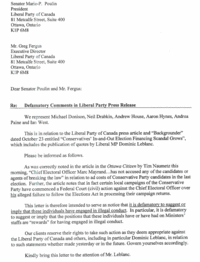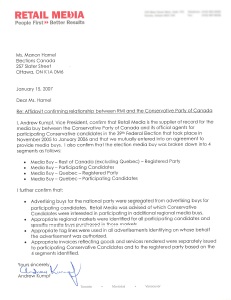A copy of a letter sent to the President of the Liberal Party Senator Marie Poulin and Executive Director Greg Fergus landed in my inbox tonight. It concerns Conservative Party assertions that statements made in a recent Liberal Party backgrounder on what they’ve named the “In and Out” scandal concerning the “Conservatives’ apparent scheme to violate election spending limits” are in fact defamatory. The Conservatives stress that “Chief Electoral Officer Marc Maynard…has not accused any of the candidates or agents of breaking the law”.
The letter concerns the defense of Michael Donison, Neil Drabkin, Andrew House, Aaron Hynes, Andrea Paine and Ian West. The letter states that “it is defamatory to suggest or imply that these individuals have engaged in illegal conduct”.
In this document, found on the Liberal Party website, the Liberals seem to imply that rewards in the form of government jobs were received by candidates who participated in the scheme that the Liberals allege.
Liberal MP Dominic Leblanc stated,
“To date, we have learned that eleven of the former Conservative candidates and official agents implicated in this scandal were named to federal appointments or were hired in high profile government jobs. One has to wonder if there is a connection between their willingness to participate and employment by this Conservative government”
The Conservatives allege that such statements are libelous as the letter addressed to the Liberals reads, “In particular, it is defamatory to suggest or imply that the positions that these individuals have or have had on Ministers’ staffs are “rewards” for having engaged in illegal conduct.”
The Conservatives seem to assert that the Liberals must prove that their accusations are true or else the Grits have libeled the aforementioned individuals.
Please read Steve Janke’s groundbreaking posts concerning this story, here, here and here.

